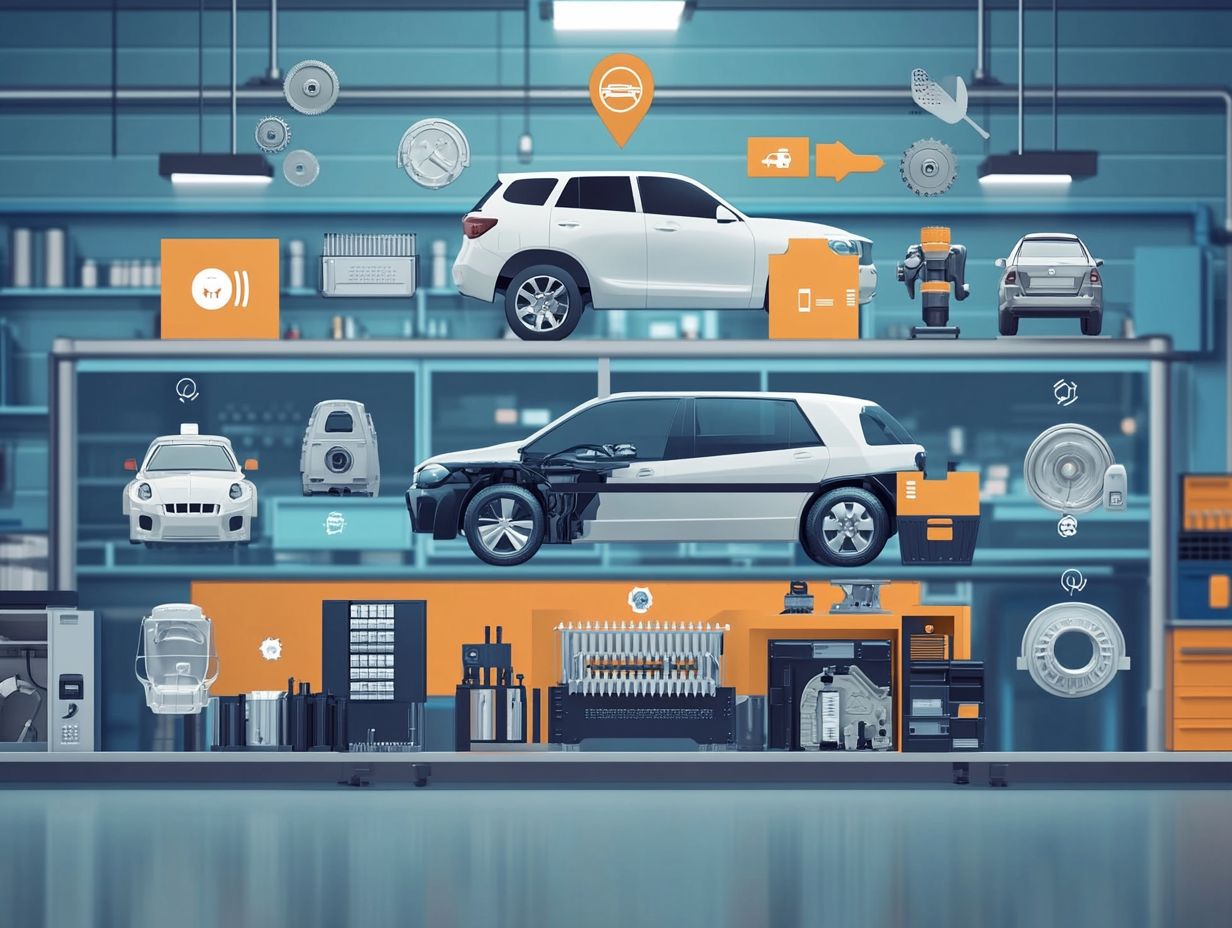Understanding Car Warranty Types and Coverage
When you invest in a vehicle, understanding car warranties is just as vital as selecting the perfect model. A car warranty acts as your safety net, shielding you from unforeseen repair expenses while granting you invaluable peace of mind.
This article examines the various types of car warranties, ranging from bumper-to-bumper to powertrain options. It details what s covered and what isn t. You ll also discover insightful tips on how to maximize your warranty and navigate the fine print.
Get ready to learn tips that could save you time and money!
Contents
- Key Takeaways:
- What is a Car Warranty?
- Types of Car Warranties
- What is Covered by a Car Warranty?
- Making the Most of Your Car Warranty
- Understanding the Fine Print
- Frequently Asked Questions
- What is meant by “car warranty types and coverage”?
- What are the most common types of car warranties?
- What is covered under a basic car warranty?
- Can I choose the length of my car warranty?
- Do car warranties cover regular maintenance and wear and tear?
- Can I transfer my car warranty to a new owner if I sell my car?
Key Takeaways:

- Understand the purpose of a car warranty, which is to provide coverage for potential vehicle repairs and replacements.
- Be aware of the different types of car warranties, such as bumper-to-bumper, powertrain, and extended warranties, to determine the level of coverage you need.
- Know the inclusions and exclusions of your car warranty, as well as key terms and conditions, to ensure you make the most of your coverage and avoid potential issues in the future.
What is a Car Warranty?
A car warranty is essentially a contractual agreement provided by manufacturers or warranty providers. It grants you a sense of automotive peace by covering certain repair costs tied to your vehicle’s components over a specified period.
This agreement typically encompasses various types of warranties, including manufacturer warranties, which are standard for new vehicles, and extended warranties that you can purchase for additional protection on used cars. This flexibility allows you to choose the options that best safeguard you against problems with the car’s parts and unexpectedly hefty repair bills.
Definition and Purpose
A car warranty offers financial coverage for various repairs and mechanical defects. This vital protection serves several purposes, shielding you from unexpected repair costs that can emerge from unforeseen malfunctions.
Warranties ensure your vehicle meets the manufacturer’s stringent standards, giving you peace of mind that your car functions safely and efficiently. By understanding your car’s warranty and maintenance, including the nuances of various coverage options such as powertrain warranties, bumper-to-bumper coverage, and extended warranties, you can significantly impact your financial decisions.
Being well-informed about these elements allows you to make choices that not only safeguard your investment but also elevate your overall driving experience.
Types of Car Warranties
Car warranties come in various forms, each serving a distinct purpose. You have the manufacturer warranty, which is included at the point of sale, providing initial coverage for your vehicle.
There s also the extended warranty, which offers additional protection beyond the standard terms. The powertrain warranty is specifically designed to cover essential components, such as the engine and transmission. The bumper-to-bumper warranty casts a wider net, encompassing a broad range of vehicle systems.
This ensures that you, as a car owner, enjoy comprehensive protection for your investment.
Bumper-to-Bumper Warranty
A bumper-to-bumper warranty offers you extensive coverage for most vehicle components. It ensures you re protected from repair costs related to mechanical defects across a broad range of systems.
This warranty includes many parts, such as the engine, transmission, electrical systems, and even some interior components. However, keep in mind that some items are not covered by this warranty.
Common exclusions often encompass items that experience wear and tear, like brakes, tires, and batteries, as well as certain maintenance procedures. Understanding these limitations is crucial, as it gives you the power to make informed decisions and sidestep unexpected out-of-pocket expenses during your vehicle ownership.
To protect your investment and maximize your car’s potential, review your current warranty or consider getting one!
Powertrain Warranty

The powertrain warranty protects your vehicle’s heart the engine, transmission, and drivetrain. It offers coverage against engine problems and other mechanical issues.
This coverage usually lasts between five to ten years or until a specific mileage limit is reached. It allows you to drive with confidence, shielding you from unexpected, costly repairs.
Having this warranty enhances your vehicle’s longevity. It ensures a smoother driving experience while easing the financial burden of major repairs.
Securing this warranty is a smart investment for any vehicle owner!
Extended Warranty
An extended warranty is a service contract that builds on your original manufacturer warranty. It gives you extra coverage options for repairs after your standard warranty ends.
This agreement can lower the financial strain of unexpected repair costs. As a vehicle owner, you can save significantly since expenses for mechanical issues can add up quickly.
With options that range from powertrain coverage to comprehensive plans including roadside assistance, it s crucial to understand the different offerings. Choosing the right extended warranty protects you from rising repair costs and enhances your overall ownership experience.
What is Covered by a Car Warranty?
Car warranties cover various mechanical defects and repair costs. This protection helps you avoid unforeseen expenses related to your vehicle.
Inclusions and Exclusions
It’s important to know what s included and excluded in your car warranty. This knowledge influences your experience with maintenance, repairs, and your budget.
For example, a typical warranty may cover engine repairs and transmission issues but often excludes wear-and-tear items like brake pads and tires. Understanding these details helps you avoid unexpected expenses and emphasizes the importance of using authorized repair facilities.
Authorized facilities are familiar with warranty requirements and ensure services align with your warranty s provisions. This can impact the outcome of your warranty claims and help prevent coverage denials.
Making the Most of Your Car Warranty
To maximize your car warranty s benefits, follow a strict maintenance schedule. Also, know your consumer rights related to warranty claims.
This knowledge empowers you to navigate the repair process confidently, ensuring everything is handled correctly.
Tips for Proper Maintenance and Usage

Stick to a regular maintenance schedule to keep your warranty valid. This will help you avoid unexpected repair costs from neglecting vehicle care.
To fully use your warranty coverage, stay diligent about inspections and servicing. Keeping detailed records of maintenance activities serves as proof of care and can help in disputes with your warranty provider.
By understanding your warranty agreement, you can avoid common pitfalls and ensure timely services. This proactive approach leads to a longer-lasting vehicle and gives you the peace of mind you deserve.
Understanding the Fine Print
Understanding the intricacies of a car warranty is crucial for you as a consumer. It lays out vital terms, conditions, and limitations that define your coverage and the claims process, making it essential to explore understanding new car warranties.
Being well-informed ensures you navigate any potential issues with confidence and clarity.
Key Terms and Conditions to Know
Several key terms and conditions are essential for understanding your vehicle’s warranty coverage, including coverage levels, exclusions, and the responsibilities of warranty providers for servicing claims.
Deductible costs refer to the amount you pay before the warranty covers the rest, significantly impacting your out-of-pocket expenses when seeking repairs. The duration of the warranty is crucial as well, influencing how long you can enjoy protection against unexpected repairs.
The varying coverage levels dictate which parts are included in your warranty. To protect your investment, it’s essential to assess these factors carefully, as they impact both the validity of your warranty and your overall financial commitments should a vehicle malfunction occur. For more detailed information, consider exploring understanding used car warranties.
Frequently Asked Questions
What is meant by “car warranty types and coverage”?
Car warranties provide different levels of protection for repairs. Some cover only certain parts, while others detail what to expect from a new car warranty that protects all major components.
What are the most common types of car warranties?

The most common types of car warranties are bumper-to-bumper warranties, powertrain warranties, and extended warranties. Bumper-to-bumper warranties cover most parts and systems, while powertrain warranties cover major engine and transmission components. For those seeking more protection, understanding common car repair warranties can provide additional coverage beyond the manufacturer’s warranty.
What is covered under a basic car warranty?
A basic car warranty typically covers major components of the vehicle, such as the engine, transmission, and electrical systems. It may also cover certain parts and labor costs for repairs or replacements due to defects or malfunctions.
Can I choose the length of my car warranty?
Yes, you can choose the length of your car warranty based on your needs and budget. Some manufacturers offer various options, such as 3 years/36,000 miles or 5 years/60,000 miles. You can also purchase extended warranties for longer coverage.
Do car warranties cover regular maintenance and wear and tear?
No, car warranties typically do not cover regular maintenance or wear and tear, including oil changes, tire rotations, and brake replacements. However, some warranties may include complimentary maintenance for a certain period.
Can I transfer my car warranty to a new owner if I sell my car?
It depends on the car warranty and the manufacturer’s policies. Some warranties are transferable and can be passed on to a new owner, while others are non-transferable and end when the vehicle is sold. Check the warranty terms and conditions before selling your car.




